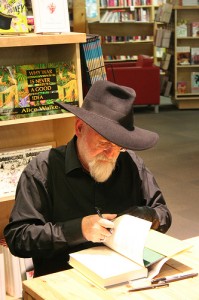 As I’m sure everyone who reads this blog already knows, Sir Terry Pratchett, author of the Discworld series, passed away last Thursday at the age of 66.
As I’m sure everyone who reads this blog already knows, Sir Terry Pratchett, author of the Discworld series, passed away last Thursday at the age of 66.
One of the hazards of being an evening and weekend blogger is that you miss the news cycle: by the time I’d even heard the sad news, several other bloggers already had posts up with their tributes to Sir Terry. But I wouldn’t have rushed to get something out at the first moment anyway; my history with Sir Terry goes too deep for that.
My first acquaintance with the man came when I happened across The Light Fantastic at the campus bookstore back in the 1980’s. I admit, I didn’t think it was anything special at the time. It seemed kind of typical. Bumbling incompetent apprentice wizard? Check. Death out to get him? Check. Funny? A little. I’d recently been reading a series by Craig Shaw Gardner about Wuntvor the Eternal Apprentice that seemed to hit a lot of the same points.
But time went on, and Pratchett wrote more, and so happens I still have that copy of The Light Fantastic. (You’d have to pay me to get me re-read anything by Gardner at this point.)
The turning point came with Pratchett’s next book, Equal Rites, which marks the first appearance of Granny Weatherwax. He was still finding his Disc legs at that point, and the book has never seemed to me to be quite of a piece with what follows; but the essential thing is that I couldn’t stop reading bits of it to Jane. Finally she insisted that I start at the beginning and read the whole thing to her; and that began a habit of reading aloud that’s lasted for nearly thirty years. There are a handful of authors that whose books I acquire on publication and read aloud to Jane; Lois McMaster Bujold sits on the throne of that pantheon, but Sir Terry is at least Bujold’s Prince Consort. I’ve read almost all of Pratchett’s books to Jane, and many of them to my children. (“Crivens!” is a not infrequent cry at our house.)
Truly, the man had a way with words. Here are some quotes from Equal Rites:
…this is also a story about sex, although probably not in the athletic, tumbling, count-the-legs-and-divide-by-two sense unless the characters get totally beyond the author’s control. They might.
(In the event, they didn’t.)
Although his body had been around quite a lot, his mind had never gone further than the inside of his own head.
One reason for the bustle was that over large parts of the continent other people preferred to make money without working at all, and since the Disc had yet to develop a music recording industry they were forced to fall back on older, more traditional forms of banditry.
“Hmm. Granpone the White. He’s going to be Granpone the Grey if he doesn’t take better care of his laundry. Aye tell you, girl, a white magician is just a black magician with a good housekeeper.”
He only got better. Seriously, Sir Terry could single-handedly keep me in quotes for my Thursday posts from now until the end of my days.
What little I know about what Sir Terry was like in his day-to-day life I learned recently from
Neil Gaiman. If his books are a guide he was skeptical of religion, regarding it as a human creation; and yet his books also display a finely honed moral sense. Here’s an oft-quoted passage from Carpe Jugulum:
“There is a very interesting debate raging at the moment about the nature of sin, for example.”
“And what do they think? Against it, are they?”
“It’s not as simple as that. It’s not a black and white issue. There are so many shades of gray.”
“Nope.”
“Pardon?”
“There’s no grays, only white that’s got grubby. I’m surprised you don’t know that. And sin, young man, is when you treat people as things. Including yourself. That’s what sin is.”
“It’s a lot more complicated than that—”
“No. It ain’t. When people say things are a lot more complicated than that, they means they are getting worried that they won’t like the truth. People as things, that’s where it starts.”
“Oh, I’m sure there are worse crimes—”
“But they starts with thinking about people as things . . .”
He had a great deal of wisdom; and so I was all the more distressed some years ago, shortly after he announced that he had Alzheimers, to discover that he had become an outspoken advocate of assisted suicide. My father had Alzheimers; I know very well how the disease can rob a family of a loved one as his faculties slowly degrade. And though my father died before his Alzheimers had completely stolen him away, I had ample opportunity to see how far the disease can progress in others, and I can well understand how Sir Terry could want to avoid that extremity.
This is not merely academic. Alzheimer’s has been the general fate of my father’s siblings (except for two who died younger of cancer), and it might well be coming for me in another couple of decades. I don’t want to go there, either.
But the time of my passing is not mine to choose; I believe that deeply. And so in my sorrow at Sir Terry’s passing I was cheered to see that he died a natural death, for I had dreaded the thought of that wise, funny man going to meet his Maker (as he now has) with his own life on his hands.
Had he done so, I’d have mourned more deeply; and I’d have prayed for him and asked God to have mercy on his soul, just as I have in fact been doing these past few days.
Eternal rest grant unto him, O Lord!












